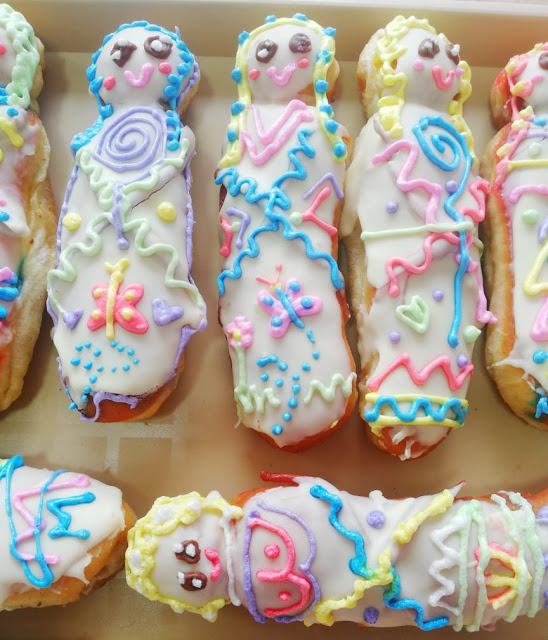Guaguas de pan - the Bread Babies for the Day of the Dead
 |
| Fancy Guaguas by Misti Donuts |
Bread figures or 'Bread Babies' have been part of the food culture of Ecuador for centuries. A traditional holiday fruit drink known as colada morada accompanies the sweet bread figures, both of which are shared by families during the day of the dead celebration known in Ecuador as Día de los Difuntos, or 'Day of the Deceased.'
The special bread figures known as guaguas de pan - guaguas means baby in Quichua - were made with pumpkin in earlier times. They were composed of boiled tortillas cooked in a pre-hispanic clay pot. These breads evolved with the arrival of the Spanish conquests when wheat was added to the sweet pumpkin bread batter. The recipe now is a basic sweet yeast dough similar to cinnamon rolls.What we know as bread figures are understood to be a representation of the deceased decorated with colorful icing and ornaments. When the Spanish conquerors came, they changed a rumored ancient custom of exhuming the dead for the occasion, and instead implemented the tradition of these bread figures accompanied with a blood-hued ancestral drink "Colada Morada" which also has a very long history in Ecuador.
Colada moradas represent nourishment for the ancestors' journey to the afterworld, and the bread figure symbolizes loved ones and deceased family members. Colada Morada has been enjoyed for more than 5,000 years by pre-columbian groups who lived in the territories now known as Ecuador. The early people collected pineapples, strawberries, mora or blackberries and mortiño (Andean blueberries) in Ecuador’s sub-tropical regions. As soon as they started using fire and clay pots to cook the fruit, they realized they could transform them into a tasty "colada." The fruits were also mixed with starches such as corn, potatoes, and quinoa. Later these drinks were used to celebrate the beginning and the end of the harvest as a symbol of the beginning and the end of life. Even later, these customs evolved to celebrate the journey of life in Andean cosmology, especially in the rainy season during October and November.Bread figures and fruity colada morada drinks become available each year in Loja during the Día de los Difuntos, or Day of the Deceased festival between October 27th and November 3rd. Life in Loja likes a contemporary take on the bread babies created by a local young Lojano food entrepreneur at Misti Donuts. Cristina, the brains behind this bakery start-up, is a food engineer trained at UTPL, Loja’s private technical university. Misti’s guaguas de pan are very light decorated and creme-filled eclair-style donuts. Some of the 'babies' from Misti are wearing masks to remind us to be careful during the holidays while the national emergency continues. Misti is an excellent choice for the times because they will deliver the treats directly to your door, so you and your family can avoid the crowds and stay healthy.This blog post is an example of how the team at Life in Loja helps tourists and visitors, expats and immigrants, to better appreciate the many aspects of living in Loja, Ecuador. If you would like to know more about our custom tours and relocation services then contact us by email or phone/WhatsApp at 593-098-674-5994 to begin a conversation.





Misti, please deliver to us in Vilcabamba. Rico!
ReplyDeleteGive the donut babies a try when you come to Loja. They are the best
Delete